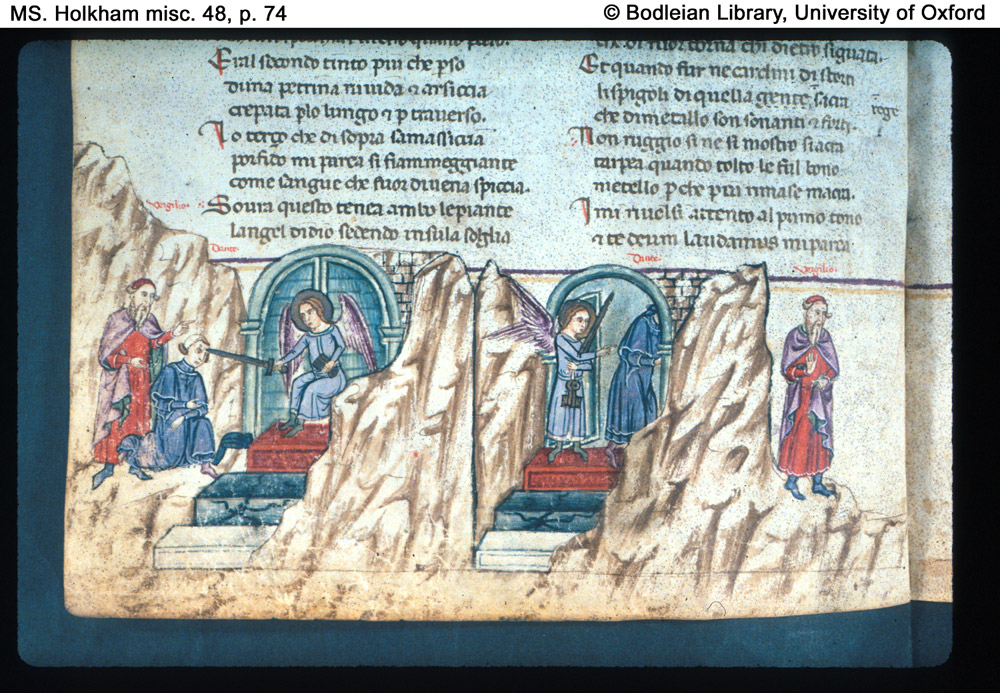This is one of the most complex and important of all the Cantos in the Commedia. Here we have the dream of Ganymede, the appearance of St. Lucia, the process of penitence symbolized in the three different colored steps, the reaction of Dante the Pilgrim, the two keys of the kingdom and the swinging wide of the Gates of St. Peter. Indeed, entire books have been written unpacking this Canto alone. Each time I return to this place, which is of course yet another threshold to cross in the Commedia, it finds me in a new position from which I gain insight on my current journey. If I were to write a new blog [heaven forbid!] five years from now as I read the Commedia again [which I most certainly will], it would surely yield different insights than the few I offer here.
The dream sequence is wonderfully dream-like, and is one of three different dreams in Purgatorio. The character and quality of the imagery and action comes right out of my own dreams, and compares favorably with many of the dreams in Hebrew and Christian scriptures: the dreams of Joseph, the visions of the Apostle John and Paul, etc. Indeed, the carrying of Dante the Pilgrim by the eagle to the steps of St. Peter’s Gate seems to come right out of Paul’s writings to the church at Corinth:
2 Corinthians 12:1–4 It is necessary to boast; nothing is to be gained by it, but I will go on to visions and revelations of the Lord. 2 I know a person in Christ who fourteen years ago was caught up to the third heaven—whether in the body or out of the body I do not know; God knows. 3 And I know that such a person—whether in the body or out of the body I do not know; God knows— 4 was caught up into Paradise and heard things that are not to be told, that no mortal is permitted to repeat. (NRSV)
But for spiritual truth and discernment, this is not just about being like St. Paul, but rather Dante the Poet and spiritual guide is stating that we cannot come to the steps of paradise solely by our own devising and good works. Grace is required. The attempt to climb this mountain or arrive at this island as a result of one’s own devising is to be the Ulysses we met in Inferno XXVI, who talked his men into leaving behind family and responsibilities to follow him on his personal, self-centered quest.
112 '"O brothers," I said, "who, in the course
'O frati,' dissi, 'che per cento milia
113 of a hundred thousand perils, at last
perigli siete giunti a l'occidente,
114 have reached the west, to such brief wakefulness
a questa tanto picciola vigilia
115 '"of our senses as remains to us,
d'i nostri sensi ch'è del rimanente
116 do not deny yourselves the chance to know --
non vogliate negar l'esperïenza,
117 following the sun -- the world where no one lives.
di retro al sol, del mondo sanza gente.
118 '"Consider how your souls were sown:
Considerate la vostra semenza:
119 you were not made to live like brutes or beasts,
fatti non foste a viver come bruti,
120 but to pursue virtue and knowledge."
ma per seguir virtute e canoscenza.'
121 'With this brief speech I had my companions
Li miei compagni fec' io sì aguti,
122 so ardent for the journey
con questa orazion picciola, al cammino,
123 I could scarce have held them back.
che a pena poscia li avrei ritenuti;
As a result, Ulysses demands that they ‘not deny themselves’ any chance of forging their way to glory and discovery, while Dante the Pilgrim and the Apostle Paul in fact progress by submission, they conquer by surrendering their wills. Dante the Pilgrim is lifted and carried into the light by St. Lucia, bearer of the light. Dante kneels and knocks, but he knocks not on the door of heaven, but on the door of his heart. Ulysses kneels to no one. Indeed, he is so slick with his reasoning that his men are the ones who kneel to him, and end up kneeling in the boat as they go under the sea, lost as a result of trying to force themselves into heaven.
The place of holiness, the quality of individuation and maturity seems to be found in the person who does not need to force his or her self upon the universe. There is a desire to humble oneself and learn from God while caring for others, rather than expecting others to submit themselves to one’s own personal demands and desires [read Ulysses].
There are so many layers of meaning in these symbols, I find it is like trying to drink from a fire hose. The color of the two keys symbolize the joint action of God’s Grace [gold] and the sinner’s repentance [white]. The three steps leading up to the gate show us the manner and means of repentance and absolution: 1.-Confession [white marble that reflects oneself] 2.-Contrition [mournful black, cruciform cracked] 3.-Satisfaction [blood red from the Cross and one’s own heart]. The seven deadly sins carved into Dante’s forehead with the letter ‘P’ for each, helping us to see that we all have within us the seeds of sin. Yet we have the means of forgiveness, growth and grace if we but look in the mirror and knock upon the doors of our hearts. It is when I assume I am not capable of cruelty and assume that others are worse than me that I, in fact, show myself to be lost and condemned.
109 Devoutly I cast myself down at his holy feet.
Divoto mi gittai a' santi piedi;
110 I begged him for mercy and to let me enter,
misericordia chiesi e ch'el m'aprisse,
111 but first, three times, I smote my breast.
ma tre volte nel petto pria mi diedi.
112 With the point of his sword he traced seven P's
Sette P ne la fronte mi descrisse
113 upon my forehead, then said: 'Once you are inside,
col punton de la spada, e "Fa che lavi,
114 see that you wash away these wounds.'
quando se' dentro, queste piaghe" disse.
This recognition that I am a sinner has spoken to me at different times and have drawn me to the place of care for others while not taking myself so ‘damned’ seriously. “Lord Jesus Christ, have mercy upon me, a sinner.” Always after reading this Canto IX in the Purgatorio, I find myself repeating the prayer attributed to St. Francis of Assisi:
O divine Master, grant that I may not so much seek
To be consoled as to console,
To be understood as to understand,
To be loved as to love;
For it is in giving that we receive;
It is in pardoning that we are pardoned;
It is in dying to self that we are born to eternal life.
And it seems totally appropriate that when the gates swing open, there is heard not the din of cries and hatred that was heard when Dante the Pilgrim stepped through the gates of Hell in Inferno Canto III.
22 Now sighs, loud wailing, lamentation
Quivi sospiri, pianti e alti guai
23 resounded through the starless air,
risonavan per l'aere sanza stelle,
24 so that I too began to weep.
per ch'io al cominciar ne lagrimai.
25 Unfamiliar tongues, horrendous accents,
Diverse lingue, orribili favelle,
26 words of suffering, cries of rage, voices
parole di dolore, accenti d'ira,
27 loud and faint, the sound of slapping hands --
voci alte e fioche, e suon di man con elle
Now compare that with the swinging wide of the Gates of Purgatory:
139 I turned, intent on a new sound,
Io mi rivolsi attento al primo tuono,
140 and thought I heard 'Te Deum laudamus'
e "Te Deum laudamus" mi parea
141 in voices mingled with sweet counterpoint,
udire in voce mista al dolce suono.
142 giving me the same impression
Tale imagine a punto mi rendea
143 one has when listening to singers
ciò ch'io udiva, qual prender si suole
144 accompanied by an organ and the words
quando a cantar con organi si stea;
145 are sometimes clear and sometimes lost.
ch'or sì or no s'intendon le parole.
We have the ‘Te Deum Laudamus’ [You Are God, We Praise You] ringing out in “voices mingled with sweet counterpoint;” a far different effect from Inferno’s cacophony. The assumption of many scholars is that the organ and vocal counterpoint is what occurred in Dante’s day during the weekly Mass. Of course, sometimes in Mass something is heard and something is lost, as Dante the Poet admits in lines 144 and 145, but the point is the shared air of worship and humility and wonder, rather than performance or vocal clarity. The journey continues, not due to perfection of the performers or holiness of the pilgrim: rather, it is the mutual recognition that Grace, like rain, falls upon all who kneel and knock in wonder and need.


 RSS Feed
RSS Feed
